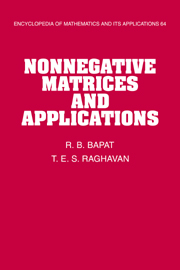Book contents
5 - Topics in combinatorial theory
Published online by Cambridge University Press: 17 September 2009
Summary
In this chapter we discuss certain combinatorial topics where positive semidefinite matrices and nonnegative matrices appear. In the first section we give a quick introduction to matroids and prove a result due to Rado, which includes Hall's Theorem on systems of distinct representatives as a special case. Then we discuss basic properties of the mixed discriminant, a function that allows a unified treatment of the theory of permanent of a nonnegative matrix and the determinant of a positive semidefinite matrix. The Alexandroff Inequality for mixed discriminants is proved and it is used to settle a special case of a conjecture of Mason. The next section deals with a topic in the area of spectra of graphs. Graphs whose adjacency matrices have Perron root less than 2 are characterized. These graphs correspond to the well-known Coxeter graphs (or Dynkin Diagrams). It is also shown that these graphs are precisely the ones giving rise to a finite Weyl group. The next section focuses on matrices over an algebraic structure called max algebra. As far as the eigenproblem is concerned, such matrices behave somewhat like nonnegative matrices. The last section deals with Boolean matrices. The main emphasis is on characterization of Boolean matrices that admit Moore-Penrose inverse.
- Type
- Chapter
- Information
- Nonnegative Matrices and Applications , pp. 196 - 238Publisher: Cambridge University PressPrint publication year: 1997

